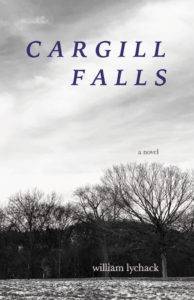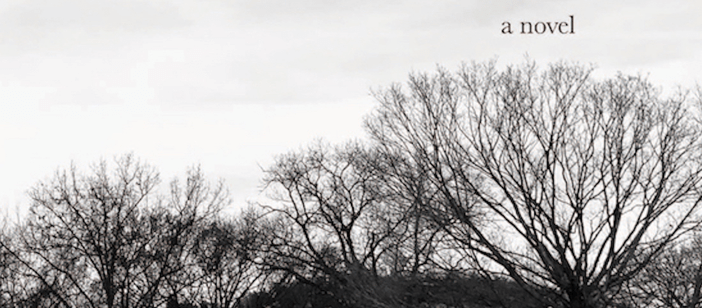From the publisher: “There is good reason why William Lychack’s writing has been called ‘Precise, exhilarating, sometimes wonderfully funny and always beautiful’ (Margot Livesey). In prose you can practically feel moving in your hands, Cargill Falls takes you through a series of unforgettable scenes that coalesce into an extended meditation on the meanings we give—or fail to give—certain moments in our lives.
The story begins when an adult William Lychack, hearing of the suicide of a childhood friend, sets out to make peace with a single, long-departed winter’s day when the two boys find a gun in the woods. Taking place over the course of just a few hours, this simple existential fact gathers totemic force as it travels backwards and forwards in time through Lychack’s consciousness and opens onto the unfinished business in the lives of the boys, their friends, parents, teachers, and even the family dog.
Cargill Falls is a moving conversation with the past that transports us into the mysteries of love and longing and, finally, life itself. Brimming with generosity and wisdom, this is a novel that reveals a writer at the top of his form…”
About the Author: Along with his new novel, Cargill Falls, William Lychack is the author of five previous books: The Wasp Eater (a novel), The Architect of Flowers (stories), a cultural history of cement, and two titles for children. His work has appeared in Conjunctions, Ploughshares, The Southern Review, The American Scholar, Story Magazine, and elsewhere, including The Best American Short Stories, The Pushcart Prize, and on public radio’s This American Life. He has received a National Endowment for the Arts Fellowship, a Christopher Isherwood Foundation Award, a Sherwood Anderson Award, and has been a Barnes and Noble Discover Great New Writers Selection. He lives in Pittsburgh, Pennsylvania, with his wife and three children, and teaches at the University of Pittsburgh. More can be found at www.lychack.com.
“Cargill Falls is an immediate classic. At once essential and profound and hugely entertaining, the story of the two boys at the heart of this book, and the men they become, follows in the tradition of great coming of age stories like Stand by Me, and then twists and reinvents and does the tradition better, upending all that we know and expect. It’s rare to come across books like this. A writer hopes that once in his or her life he or she can write something so honest.” —Charles Bock, author of Beautiful Children and Alice and Oliver
“In how it slows down the world, William Lychack’s Cargill Falls achieves something quite unexpected: this is a book that makes your heart drum loudly, that leaves you breathless under the tall canopy of a forest in Connecticut in the 1980s, that pulls you toward a single day’s burning, bright core. Not since William Maxwell’s So Long, See You Tomorrow has a novel captured so wondrously the landscape of youth, regret, mystery, and violence, and done it with such tenderness, humor, and raw, wild energy.” —Paul Yoon, author of Once the Shore, Snow Hunters, and The Mountain
“William Lychack’s exquisite sensibility of language combines with delicate dramatic tension as he explores the possible meaninglessness of causality. What if one event is not related to another? This is the best novel about adolescent boys I can remember.” —Blanche McCrary Boyd, author of Tomb of the Unknown Racist and The Revolution of Little Girls
“A double dimension dream of a book, Cargill Falls trapezes adroitly between the quotidian’s ancient ache and the elusive, gleamingly provocative escutcheon of the ideal. It is moving, tender, and compelling from start to finish.” —Patrick McCabe, author of The Butcher Boy and Heartland
 We once found a gun in the woods—true story—me and Brownie, two of us walking home from school one day, twelve years old, and there on the ground in the leaves was a pistol. Almost didn’t even notice. Almost passed completely by. Had to be the last thing we expected, gun all black and dull at our feet, Brownie almost kicking it aside like an empty bottle or little-kid toy.
We once found a gun in the woods—true story—me and Brownie, two of us walking home from school one day, twelve years old, and there on the ground in the leaves was a pistol. Almost didn’t even notice. Almost passed completely by. Had to be the last thing we expected, gun all black and dull at our feet, Brownie almost kicking it aside like an empty bottle or little-kid toy.
But then we saw what it was for real and got those shit-eating grins on our faces. We looked back to make sure no one else was coming. Nothing but skinny trees and muddy trail in either direction. Not even a bird chirping that we could hear. We held our breath to listen, everything so quiet we were afraid to move, whole world teetering as if balanced on a point.
Late winter, early spring, and we picked whatever leaves and twigs from around the gun. We made a nest for the thing, neither of us saying a word. No shine to the metal at all. No trace of kindness anywhere in this object. Just sharp lines and hard edges.
Soon we were poking it with sticks. We hunched down close to read the stamp on the barrel—COLT, GOVERNMENT, CALIBER .45—like we had any idea what any of this meant. We were just kids, Brownie a big romp of a boy with straight-across bangs and face full of freckles, and this Mouse character—me—standing alongside with my ears and toothy smirk, the two of us there in the middle of the woods with a gun.
What could go wrong?
Brownie pulled his hand into his sleeve and slowly lifted the pistol as if from out of a fire. He dangled the gun in front of me. It seemed to absorb the light in a way that made me feel bad for us.
“This,” said Brownie, “is seriously real.”
And still those dopey grins to each other—him and me in total cahoots—as if already we were permanently linked by whatever this was going to be. Some part of us must have wanted to make the gun a story we could tell about ourselves. Good or bad, great or small, it felt like a spell we were under, Brownie going back and forth with the gun under my nose.
“Let me see it,” I told him. I stood with my hand open and waited until he stopped and lowered the gun to me. My arm tugged with the weight, that solidness so much more satisfying than anyone could have ever explained. The diamond ridges of the grip, the cold fit of the gun in the palm of my hand.
Without thinking I pointed the gun at Brownie—at his chest, my finger curling over the trigger—and he put up his hands and said don’t shoot.
“I’m innocent!” he said.
“Gimme the cash,” I told him.
“Okay, okay,” he said and made like he was counting out money. I waved for him to hurry along. Should have been funny, the old bank robber routine, the flustered clerk, the wag of gunpoint, seen it a hundred times.
Years from this place—a lifetime away that one afternoon—and still I can’t help but wish I could reach down and somehow lift the gun away from these two little idiots. Give them baseball practice or trumpet lessons. Somehow linger them back to the playground after school with friends. Wish I could make a train set of their town: Cargill Falls, Connecticut, circa 1980, its old mills and tired worker houses, its churches and sidewalks and cemeteries, the grocery and package stores, that constant hint of potato chips in the air from the Frito-Lay plant in the next town over. If I could, I’d put those boys anywhere but the woods that day. I’d set them out by the train station, figurines throwing rocks at freight cars going by. I’d wander them home through a kind of Busytown, give them bikes to ride, whisper for them to get out of here already. That’d be me rustling the maple and oak leaves, just enough to spook these kids away.
Not like they’d have listened, of course. Not like they’d have been able to hear a single word. All the iron filings would line up on that magnet of a gun for them, and yet there were so many things a pair of boys might have done different at this point in the story. We could have gone straight to the police. We could have swaddled the pistol to leave on the steps of the fire station. We could have called my mother at the department store where she worked.
She’d be in PETS or TOYS or CUSTOMER SERVICE near the back. They’d have to page her over the intercom. She’d need to make her way past the registers with this fear growing in her that the worst had happened. We could turn that fear of hers into something tangible, something more than just credit for being good. We could use the gun to get something, something equal to the relief she’d feel when she knew we were safe.
Mrs. Brownell worked at the front desk of the middle school. Every day she sat stern and impassible, dealing with kids in trouble. If we went to her, she’d know just by the looks on our faces that something was wrong. Yet with this raw weight and power in our hands, we no longer wished to be smart or nice anymore.
We wanted to use the gun.
We needed to shoot something.
It was as plain and obvious and stupid as that.
For whatever reason, the two of us needed to make what everyone would think was the exact wrong decision. Otherwise, we’d have long since started for Brownie’s father at CL&P—Connecticut Light and Power—the two of us finding Mr. Brownell in one of the big maintenance stations, man up to his elbows in some engine or generator.
We would have approached all timid and shy, awed by that half-dim cathedral of machinery, Brownie’s father annoyed at first to be interrupted at work, saying, “This better be good.”
But then in a moment he would have been so proud when we showed him, when he realized what we’d just done by coming to him. Such an obvious triumph it would have been, though we must not have wanted to shine in any such way, because we never went near the power company that afternoon, never went looking for him down at the Elks or the Knights of Columbus or wherever it was he’d end up this time of day. We would never sit waiting for the man to arrive at the top of Addison Street.
He would have driven past us sooner or later, that rattle of utility truck in the dusk, Brownie’s father coming home, pulling up to the curb, saying, “What are you two numbnuts doing out here?”
This excerpt from Cargill Falls is published here courtesy of the publisher and should not be reproduced without permission.

























